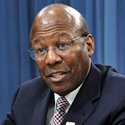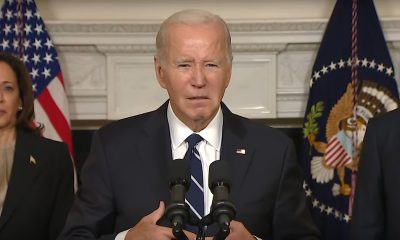National
Pentagon maps out way ahead for open service
Officials pledge to move forward with ‘Don’t Ask’ repeal swiftly


Under Secretary of Defense for Personnel & Readiness Clifford Stanley and Vice Chairman of the Joint Chiefs of Staff Gen. James Cartwright (Blade photo by Michael Key).
Top Pentagon officials on Friday gave assurances that the U.S. armed forces would implement “Don’t Ask, Don’t Tell” repeal swiftly and that training need not be instituted throughout the entirety of the military before an end to the gay ban is certified.
During a news conference, Under Secretary of Defense for Personnel & Readiness Clifford Stanley and Vice Chairman of the Joint Chiefs of Staff Gen. James Cartwright briefed reporters on Pentagon plans for moving ahead with open service.
Cartwright noted that ending the gay ban doesn’t require “100 percent of the people to be trained” and said troops in the Reserves and National Guard may not receive the new education before going forward.
“We’re going to try to get as a high percentage of the units as quickly as we can — and that will be our focus initially — because that’s the way we manage deployments,” Cartwright said. “But it doesn’t require 100 percent of the people, and we’re going to have some challenges with Guard and Reserve that are not on active duty right now, finding them, getting to them, etc.”
In a statement, Aubrey Sarvis, executive director of the Servicemembers Legal Defense Network, said he concurs with Cartwright’s assessment that training need not be instituted throughout the entire military before going ahead.
“I agree with General Cartwright that all of the troops, from top to bottom, do not need to undergo a comprehensive training and educational program before there is certification,” Sarvis said. “The training and education plan need only be in place. The fact is education and training around open service can be accomplished in the first and second quarter of this year.”
During the news conference Stanley echoed comments made earlier this month by Gates and said he envisions the implementation of repeal being a three-step process. The first step would be changing policies and regulations; the second, issuing new training; and the third, educating the actual force.
“As we do that, and we’re doing it expeditiously,” Stanley said. “We’re doing it quickly in terms of the first parts of that.”
Stanley said the military services will start the training in February, but noted each service is going to approach training differently.
Cartwright similarly said the military service chiefs feel the best way to move forward with repeal is move as quickly as possible — even as he acknowledged that process of educating 2.2 million in the U.S. military means “we’re probably going to have some discovery as we go.”
“The service chiefs — the one key activity that has probably common to all of the meetings has been feeling that moving along expeditiously is better than dragging it out,” Cartwright said. “We’ve learned that from other services, other nations that have moved down this path.”
Cartwright said the Pentagon has instituted a “feedback mechanism” in which the service chiefs would meet every two weeks to discuss changes and concerns as the implementation process moves forward.
In a statement, Alex Nicholson, executive director of Servicemembers United, said the speed with which the Pentagon is moving with implementation of “Don’t Ask, Don’t Tell” repeal is “promising.”
“We will continue to monitor this process and communicate any concerns that arise to the military leadership as the process unfolds, but overall we are pleased with the Pentagon’s good faith effort to move with deliberate speed to end this chapter in our history,” Nicholson said.
In a memo issued Friday, Defense Secretary Robert Gates tasked Stanley with producing for implementing repeal of “Don’t Ask, Don’t Tell” repeal no later than Feb. 4. Also on Friday, Stanley issued policy guidance to the military services directing them to identify regulations that would be affected by repeal of “Don’t Ask, Don’t Tell” and to draft changes to conform to an end to the law.
“We expect to see essentially not a lot of changes in the policy, but there definitely needs to be policy clarification,” Stanley said.
President Obama signed legislation allowing for “Don’t Ask, Don’t Tell” repeal on Dec. 22, but the gay ban won’t be off the books until he, the defense secretary and the chair of the Joint Chiefs of Staff certify the military is prepared. After certification takes place, an additional 60-day waiting period must pass before gays can serve openly.
In his State of the Union address, Obama committed to implementing open service in the military this year. Gates has said he wants to implement new training before moving forward.
Asked whether there’s a target date for when certification will take place, Stanley declined offer a specific time and said the conditions on the ground will “dictate how fast we go.”
“To even imply that we have a target to do it by this date would be a misnomer,” Stanley said. “In essence, we’re going to move responsibly, quickly, but deliberately as we go through the process.”
Despite Obama’s commitment to make repeal happen by the year’s end, Cartwright said the military reserves the right to withhold certification for longer if a service chief hasan objection or if an unforeseen issue arises.
“If there’s an outstanding issue that we just didn’t anticipate, we certainly would reserve the right for that service chief, one, to have a voice in it, and two, to potentially … delaying activity,” Cartwright said.
Until certification takes place, Stanley said gay service members could still be discharged under current law. He added he’s heard “nothing about” a moratorium from within the Pentagon that would prevent discharges until that time, despite calls from lawmakers and activists to issue such an order.
In October, the Pentagon issued new regulations raising the discharge authority under “Don’t Ask, Don’t Tell,” which seem to have brought expulsions to a halt.
One lingering concern is whether the benefits that gay service members will receive will be on par with the benefits afforded to their straight counterparts.
Stanley’s guidance states that the Defense of Marriage Act prohibits the U.S. military from affording many benefits to same-sex partners of service members, but other benefits, such as death benefits, would still be available.
During the news conference, Stanley said the Pentagon plans no policy changes for benefits, but added leadership still may look at “emerging things” that may come forward as open service is implemented.
“There could be some things we aren’t anticipating,” Stanley said. “That’s why this is not so locked in and concrete. We’re saying, ‘Right now, no policy changes dealing with benefits.” But there could be something we don’t know about and that’s what aperture kind of remains slightly open.”
In a statement, Joe Solmonese, president of the Human Rights Campaign, said Stanley’s memo was too limited in proposing new benefits and protections for gay troops.
“While this implementation plan is a step in the right direction, it is critical that the Department address benefits issues and non-discrimination protections so that all service members are treated equally,” Solmonese said.
The HRC statement says that greater parity in benefits could be accomplished by revising regulations to add same-sex partners to the definitions of “dependent,” “family member,” or other similar terms in military regulations.
Further, HRC asserts that the Military Equal Opportunity program could be amended so gay servicemembers have a way to address discrimination complaints.
“Equalizing benefits and non-discrimination programs will ensure that gay, lesbian and bisexual service not be seen as different from their colleagues but rather on an level playing field,” Solmonese said.
Richard Socarides, president of the watchdog group Equality Matters, said he was disappointed non-discrimination protections by way of executive order or regulatory change weren’t mentioned during the news conference as a way to move forward.
“For implementation to succeed, the President must set a clear non-discrimination rule as President Truman did in 1948 when he desegregated the armed forces,” Socarides said. “That is the kind of leadership we need today.
Asked during the news conference what legal recourse gay service members would have if they faced discrimination, Stanley said the military code or principles already troops from being treated unfairly.
“The remedies you have are the remedies that already exist,” Stanley said. “There’s no need to create new remedies for that.”
Cartwright added service members have the right to speak to a superior officer if they feel they are being treated unfairly.
“We make sure that an individual has a way to remedy, even if they’re not sure that this was a law or a policy that was broken,” Cartwright said.
Pressed on whether a service members could assert discrimination based on sexual orientation to a superior officer, Cartwright said he would defer comment to a lawyer on the “exact right language” in addressing the issue.
Download Stanley’s guidance here.
U.S. Supreme Court
Concern over marriage equality in US grows two decades after first Mass. same-sex weddings
Gay and lesbian couples began to marry in Bay State in 2004

Two decades after Massachusetts became the first state to legalize same-sex marriage, a new study reveals both significant progress and ongoing challenges for married LGBTQ couples in the U.S., with a growing sense of insecurity about the future of their rights.
The Williams Institute at UCLA School of Law surveyed 484 married same-sex couples from all 50 states and D.C. The study, released Monday, marks the 20th anniversary of legal same-sex marriage in the U.S.
Researchers found that 93 percent of respondents cited love as a primary reason for marrying, with 75 percent also mentioning legal protections. Over 83 percent reported positive changes in their sense of security, and 74.6 percent noted improved life satisfaction since marrying.
However, the study also highlighted persistent discrimination and growing concerns about the future. About 11 percent of couples who had a wedding reported facing prejudice during the planning process.
Alarmingly, nearly 80 percent of respondents expressed concern about the potential overturning of the 2015 Obergefell v. Hodges decision, which legalized same-sex marriage nationwide. This anxiety has been exacerbated by initiatives like Project 2025, a conservative policy blueprint that some fear could roll back LGBTQ rights if implemented.
The possibility of a former President Donald Trump victory in the upcoming election has further intensified these concerns. Many respondents cited Trump’s previous U.S. Supreme Court appointments and his statements on LGBTQ issues as reasons for their apprehension. One participant stated, “The thought of another Trump presidency keeps me up at night. We’ve come so far, but it feels like our rights could be stripped away at any moment.”
The current political climate has 29 percent of respondents considering moving to another state, with 52.9 percent citing socio-political concerns as a primary reason. This reflects a growing sense of insecurity among LGBTQ couples about their rights and freedoms.
Brad Sears, founding executive director of the Williams Institute, noted, “The data clearly show that marriage equality has had a profound positive impact on same-sex couples and their families. However, it also reveals ongoing challenges and serious concerns about the future of these rights in light of current political trends and the upcoming election.”
Christy Mallory, legal director at the Williams Institute and lead author of the study, added, “This research provides crucial insights into the lived experiences of same-sex couples two decades after marriage equality began in the U.S. The high level of concern about potential loss of rights underscores the continued importance of legal protections and public support for LGBTQ+ equality.”
The study found that 30 percent of surveyed couples have children, with 58.1 percent of those parents reporting that marriage provided more stability for their families. However, many of these families now worry about the security of their legal status in the face of potential policy changes and shifting political landscapes.
As the nation reflects on two decades of marriage equality, the study underscores both the transformative power of legal recognition and the ongoing need for vigilance in protecting LGBTQ+ rights. The findings highlight the complex reality faced by same-sex couples in America today: Celebrating hard-won progress while grappling with uncertainty about the future, particularly in light of upcoming political events and potential shifts in leadership.
State Department
State Department hosts meeting on LGBTQ rights and foreign policy
Event took place before Pride Month reception

Secretary of State Antony Blinken on Thursday hosted a group of LGBTQ activists and politicians from around the world at the State Department.
The event — described as a “Convening on U.S. Foreign Policy: National Security, Inclusive Development, and the Human Rights of LGBTQI+ Persons” — took place before the State Department’s annual Pride Month reception. Participants included:
• Jessica Stern, the special U.S. envoy for the promotion of LGBTQ and intersex rights
• U.S. Ambassador to the U.N. Linda Thomas-Greenfield
• U.S. Trade Representative Katherine Tai
• U.S. Ambassador to India Eric Garcetti
• Suzanne Goldberg, senior advisor to the Under Secretary of State for Civil Security, Democracy, and Human Rights
• Under Secretary of State for Civilian Security, Democracy, and Human Rights Uzra Zeya
• U.S. Agency for International Development Senior LGBTQI+ Coordinator Jay Gilliam
• USAID Counselor Clinton D. White
• National Security Council Senior Director for Democracy and Human Rights Kelly Razzouk
• Assistant U.S. Secretary of Health Adm. Rachel Levine
• National Security Council Human Rights Director Jess Huber
• U.N. Assistant Secretary General for Human Rights Ilze Brandt Kehris
• Icelandic Ambassador to the U.S. Bergdís Ellertsdóttir
• Council for Global Equality Co-Executive Director Mark Bromley
• Outright International Senior Advisor for Global Intersex Rights Kimberly Zieselman
• Essy Adhiambo, executive director of the Institute for Equality and Non Discrimination in Kenya
• Pau González, co-chair of Hombres Trans Panamá and PFLAG-Panamá
“Forty-five years ago, thousands gathered in D.C. in what became the first national march for LGBTQI+, demanding their voices be heard,” said Thomas-Greenfield in a post to her X account that showed her speaking at the event. “We must continue to carry forward the spirit of these pioneers and fight for equal rights and dignity for all.”
Forty-five years ago, thousands gathered in DC in what became the first national march for LGBTQI+, demanding their voices be heard.
We must continue to carry forward the spirit of these pioneers and fight for equal rights and dignity for all. 🏳️🌈🏳️⚧️ pic.twitter.com/oph2Ahmfhq
— Ambassador Linda Thomas-Greenfield (@USAmbUN) June 28, 2024
President Joe Biden in 2021 signed a memo that committed the U.S. to promoting LGBTQ and intersex rights abroad as part of his administration’s overall foreign policy.
“LGBTQI+ rights are human rights,” said Blinken. “Our government has a responsibility to defend them, to promote them — here and everywhere.”
Blinken noted consensual same-sex sexual relations remain criminalized in 64 countries, with the death penalty in 11 of them.
He specifically highlighted Uganda’s Anti-Homosexuality Act and Hungarian Prime Minister Viktor Orbán’s government’s “smearing scapegoating, stigmatizing LGBTQI+ persons — vilifying them with degrading labels, denying them equal rights, normalizing violence against them.” (Gay U.S. Ambassador to Hungary David Pressman this month marched in the annual Budapest Pride parade.)
Blinken noted Iraqi MPs earlier this year “passed legislation that punishes same-sex relations with up to 15 years in prison.” He also pointed out that Indonesian lawmakers approved a new criminal code banning extramarital sex.
“In a nation where same-sex couples cannot marry, these laws effectively make all same-sex conduct illegal and they undermine privacy for all Indonesians,” said Blinken.
“We’re defending and promoting LGBTQI+ rights around the world,” he said.
Blinken noted seven countries — Barbados, St. Kitts and Nevis, Antigua and Barbuda, Dominica, Namibia, Singapore, the Cook Islands — have decriminalized consensual same-sex sexual relations over the last two years. He also highlighted Greece, Liechtenstein, and Thailand this year extended marriage rights to same-sex couples, and other countries are banning so-called “conversion therapy.”
“These achievements are possible because of incredibly courageous human rights defenders and government partners on the ground, but I believe America’s support is indispensable,” said Blinken. “When we engage — sometimes publicly, sometimes privately, sometimes both — when we share our own knowledge and experience, we can and we do achieve change.”
Blinken also announced the U.S. now considers sexual orientation and gender identity are part of the International Covenant on Civil and Political Rights that took effect in 1976.
“This is one of the key treaties committing nations to upholding universal rights,” he said.
“In our regular reporting to the council on human rights, we will continue to include incidents of discrimination or abuse committed against LGBTQI+ persons, now with the clear framework of this well-supported interpretation,” added Blinken. “That will further empower our efforts.”
Blinken reiterated this point and the Biden-Harris administration’s commitment to the promotion of LGBTQ and intersex rights abroad when he spoke at the State Department’s Pride Month event.
“Defending, promoting LGBTQI+ rights globally is the right thing to do, but beyond that, it’s the smart and necessary thing to do for our country, for our national security, for our well-being,” he said.
The White House
Jill and Ashley Biden headline White House Pride celebration
First lady celebrated historic pardons of LGBTQ veterans

First lady Jill Biden and the president and first lady’s daughter, Ashley Biden, headlined the White House Pride celebration on the South Lawn on Wednesday, followed by a performance by singer and actress Deborah Cox.
“My dad has built the most pro-equality administration” in history, Ashley Biden said, crediting the work of LGBTQ people of color like Marsha P. Johnson, a prominent figure in the Stonewall uprising of 1969, as well as “so many of you [who] have continued to lead their fearless fighting against against injustice here and around the world.”
She introduced her mother as “the woman who taught me to be myself up showed me in so many ways how I can make a difference” and who “works every single day, tirelessly, to ensure that all people have the opportunities and freedoms that they deserve.”
“I hope that all of you feel that freedom and love on the South Lawn today,” Jill Biden said.
Her remarks were briefly interrupted by a protestor’s chants of “no Pride in genocide,” which was drowned out by chants of “four more years.”
The first lady noted how many of the attendees came “here from states that are passing laws targeting LGBTQ Americans.”
“There are those who see our communities and our families and wish to tear them down,” she said, “those who can’t see that the world is so much bigger and [more] beautiful than they know — but when our homes are threatened, when they strip away our rights, and deny our basic humanity, we say, ‘not on our watch.'”
“Pride is a celebration, but it is also a declaration,” the first lady said, highlighting the U.S. Supreme Court’s ruling in Obergefell v. Hodges nine years ago, which established marriage equality as the law of the land.
She then credited the accomplishments of the Biden-Harris administration on matters of LGBTQ rights, including the repeal of the previous administration’s ban on military service by transgender servicemembers and the FDA’s loosening of restrictions on blood donation by gay and bisexual men.
The first lady also celebrated the president’s announcement earlier on Wednesday that he will pardon LGBTQ veterans who were discharged and court martialed because of their sexual orientation or gender identity.
“We will never stop fighting for this community,” she said.

-

 Canada1 day ago
Canada1 day agoToronto Pride parade cancelled after pro-Palestinian protesters disrupt it
-

 Theater5 days ago
Theater5 days agoStephen Mark Lukas makes sublime turn in ‘Funny Girl’
-

 Baltimore4 days ago
Baltimore4 days agoDespite record crowds, Baltimore Pride’s LGBTQ critics say organizers dropped the ball
-

 Sports4 days ago
Sports4 days agoHaters troll official Olympics Instagram for celebrating gay athlete and boyfriend











